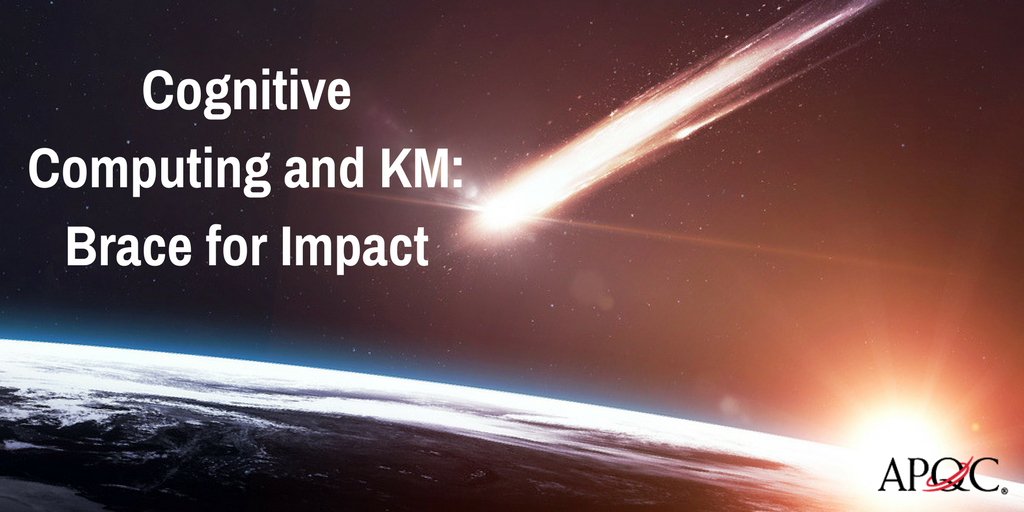Today is Meteor Day 2017, and it has been about 66 million years since a giant asteroid crashed into the Earth, wiping out the dinosaurs. Just last month, a new BBC documentary revealed that it wasn’t the size of the asteroid that did it – it was the fact that the giant object made impact in the worst possible spot, creating massive amounts of vaporized rock.
 Just as scientists are still making new discoveries about that fateful day, humans are making other discoveries that will change the way people live and work. Take, for example, cognitive computing – a term that you’re likely to hear a lot in the coming years.
Just as scientists are still making new discoveries about that fateful day, humans are making other discoveries that will change the way people live and work. Take, for example, cognitive computing – a term that you’re likely to hear a lot in the coming years.
IT experts predict that this disruptive technology is going to be The Next Big Thing. Many believe that its impact on how we do business is going to be as explosive as an asteroid hitting the Earth – and if knowledge management professionals are not ready for it, their KM programs could soon be as extinct as the dinosaurs.
Cognitive computing will transform KM
If you thought social media was a game-changer, wait until you see what cognitive computing has in store for us. Cognitive computing refers to computers that mimic human thought processes, but process information far beyond human capabilities. Smart machines, machine learning, and predictive analytics will soon permeate every aspect of our lives, radically changing how we collect, analyze, and interact with information in the digital world.
At the heart of it all, of course, is knowledge. That’s why last year’s APQC KM Advanced Working Group chose to explore the potential impact of cognitive technology and its application to classic KM challenges. Their findings can help KM professionals understand what cognitive computing can do, how it applies to KM, and how they need to adapt.
The group identified six areas where cognitive computing has the most potential for KM:
- Content curation: Machine learning can traverse divergent data types and sources, identify patterns and similarities, and cluster items in logical groups. Content then can be tagged and displayed, both proactively and on demand in response to search queries. The technologies can also help organizations pinpoint areas where they have content gaps.
- Search and discovery: This may be the highest-potential area of impact for KM. As search functionality evolves to incorporate cognitive capabilities, it is able to provide more comprehensive answers, interpret images or videos, and extract and combine information that otherwise would remain hidden in multiple documents. Users will be able to ask questions and get explicit responses in narrative form. The result is like having a Siri or Cortana that specializes in your organizational knowledge.
- The digital sidekick: Cognitive systems that include intelligent personal assistants can give team members fast access to organizational knowledge, wherever they go. Employees could use them to quickly find content summaries or drill down to deeper information. And because these systems can “learn” over time, they can also seek out and deliver insights or suggestions based on an individual user’s workflow or behavior patterns.
- Expertise location: Rather than relying on manually updated employee profiles to locate an organizational subject matter expert, cognitive systems could scan multiple source of information, from official job descriptions to project documents, emails, and social networking threads. The systems then can direct users to people with recent, targeted expertise on virtually any topic.
- Data visualization: Cognitive computing can create visual representations of data and knowledge – charts or graphs displaying massive amounts of information – with record speed. This allows people to quickly disseminate information that is easier to understand. Because it’s done with massive processing power that the human brain can never match, it can also reveal additional connections and insights that a human might miss.
- Lessons-learned analytics: A cognitive system can analyze lessons-learned databases as well as project logs, seeking patterns and trends. It can sort lessons and send alerts that are tied to a specific project stage or type of project, helping teams share information to avoid pitfalls. This means less redundancy and “reinventing the wheel,” with better quality projects that move faster and are less prone to error.
Countdown to impact: 3, 2, 1 …
If this all sounds futuristic to you, keep in mind that these capabilities already exist. At this stage, they may be priced a bit too high for most organizations’ budgets. But as more vendors create more solutions (and more of them become accessible via the cloud), prices should begin to decline. That’s when the future of “smart” KM will really take off—and it’s going to happen soon.
To be ready to hop on the cognitive computing wave when it hits, KM professionals should start researching existing technologies, weighing the possibilities, and creating a game plan for getting started as the tools become more accessible.
Learn more about cognitive computing and the evolution of knowledge work in the APQC Knowledge Base, or dive into our podcasts to hear APQC CEO Carla O’Dell and me explore the impact of cognitive computing.
When cognitive computing hits your organization, will it drop in like a meteor, causing a massive shockwave? Or will you be ready and waiting to harness its energy to improve your KM program?